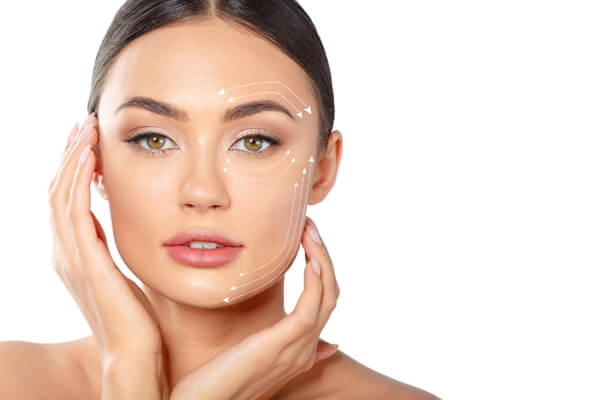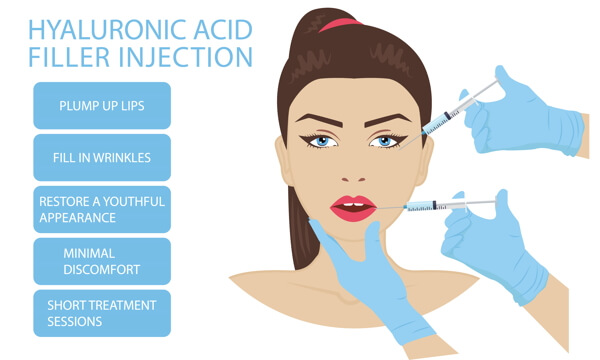Facial fillers, also known as dermal fillers, are a quick way to rejuvenate your skin. You can plump the thinning lips, give yourself eyebrows a lift, enhance cheekbones, smoothen smile lines, eliminate under-eye circles and leave you looking like a younger version of yourself.
Different Types of Facial Fillers
Different types of facial fillers are a quick and effective way of rejuvenating your skin. You can be injected in less than an hour and yes there is little to no downtime afterward. Facial fillers have little to no side effects. Temporary is the keyword when talking about the only other potential downside of facial fillers. Fillers basically add the lost volume to your face and plump areas, so that those deep-set lines are smoothened. Your collagen and elastin levels start to decline at a rate of about 2% per year, and the levels start declining when you are in your late twenties.
What Are the Most Popular Derma Fillers
One of the most important facial filler treatment is hyaluronic acid, it is the natural substance found in different areas of the body such as eyeballs, joints, and skin that can retain 1000 x its weight in water. Hyaluronic facial fillers help to maintain shape and fill out the indentations in the skin and provide hydration.
Poly-Caprolactone (PCl) or Ellanse is another popular filler that acts as a great collagen stimulator. When it is injected in specific places in the face, it activates the body’s natural response as it produces collagen.
The Difference Between Botox and Dermal Filler?
What to know about Botox and dermal fillers? There is a marked difference between the Botox and fillers. It stops the small muscles in your face from making the movements that can cause wrinkles, whilst dermal fillers plump the wrinkle to smoothen them out and regenerate the youthful look.
There are a number of dermal fillers. Here are some of the most common types are:
- Calcium hydroxylapatite
The brand of the same is Radiesse
You can find Calcium hydroxylapatite naturally in human bones and is a mineral-like compound. You can use it to treat,
Moderate-to-severe creases such as marionette lines, nasolabial folds and frown lines.
Promotes fullness of the cheeks and other facial contours.
Enhances the volume in areas of facial wasting in people who are HIV-positive taking certain medications
Calcium hydroxylapatite is produced bio-synthetically; no animals or animal products are used. This minimizes your chances of reducing the allergic reaction and one does not need skin testing. This type of dermal filler offers natural results. These types of dermal fears have been tried and tested before, especially in dentistry and reconstructive surgery.
- Hyaluronic acid
There are several brand names for this such as Captique, Esthélis, Perlane, Hylaform, Juvederm, and Prevelle and so on.
Hyaluronic acid injections drastically help improve the skin’s contour and reduce the indentations in the skin as a result of scars, injury or lines. Hyaluronic acid improves the following skin issues,
- Acne Scars
- Cheek indentations,
- Wrinkles at the corner of your eyes, more commonly known as crow’s feet.
- Deep smile lines that extend from the side of the nose right to the corners of the mouth (also known as nasolabial furrows)
- Frown lines between your eyebrows
- Correcting and redefining lip border
- Scars caused by burns, acne, and wounds
- Vertical lines on the mouth, also known as smoker’s lines.
- Some facial scars
- Worry lines on your forehead
Hyaluronic acid is naturally found in your body and high concentrations are particularly soft connective tissues and in the fluid surrounding your eyes. It can be found in your cartilage and joint fluids, apart from your skin tissues. It is reformulated and now used as different types of injectable fillers. It is also used in people who have aching joints as in arthritis to provide that bit extra cushioning.
- Polyalkylimide
Aquamid is one of the brand names.
- Plastic surgeons use Polyalkylimide as a semi-permanent dermal filler to treat,
- Deeper lines such as nasolabial folds or depressed scars
- To enhance and plump thin lips
- Add definition to cheekbones and the jawline, and add facial volume lost due to aging.
- Stall facial wasting from HIV medications
Polyalkylimide is biocompatible, and hence no allergy test is required. It also does not interfere with X- rays and hence is radio transparent.
The treatment helps develop a thin layer of collagen over the course of about a month. The gel is then completely surrounded. A single procedure has the potency to inject large volume. This product can even be removed if it so requires.
- Polylactic acid
One of the brand names is Sculptra
Polylactic acid is synthetic dermal filler and can be injected into your face, increasing the body’s own collagen production. This type of dermal filler can also be known as the stimulator. This non-toxic, biodegradable substance has been used for years as a reliable suture material.
Polylactic acid is particularly in working on the lower half of your face, and is used for the following reasons,
- Treat laugh lines
- Plump thin lips
- Treat deeply entrenched nasolabial folds
This treatment does not produce immediate results. Instead, it helps stimulate the body’s collagen production, so results show after almost a month. Continue with the treatment for about a month for fast results. You have to be patient as it requires six months to show results. This type of fillers is semi-permanent, so it may require regular touch-ups.
- Polymethyl-methacrylate microspheres (PMMA)
The brand name of the same is known as the Bellafill.
PMMA is considered semi-permanent filler and is effective in treating medium-to-deep wrinkles, folds, and furrows, specifically nasolabial folds. It helps fill out pitted scars and fill up thin lips.
PMMA is much sought-after as the results are permanent so it is sometimes more preferred over collagen replacement therapy or hyaluronic therapy. However, one downside of the same is that PMMA requires more injections and takes three months to show the full effects. It is important to find a plastic surgeon who is familiar with the proper technique and administers the injection at the dermal-subcutaneous junction using proper techniques such as threading or tunneling methods.
Dermal fillers are different as it has a different chemical makeup, longevity and offers varying degrees of softness. Softer fillers can be used for the lips and the sturdier fillers are used to enhance cheekbones.
Your surgeon will find out which type works best for you and is best suited to your skin.










